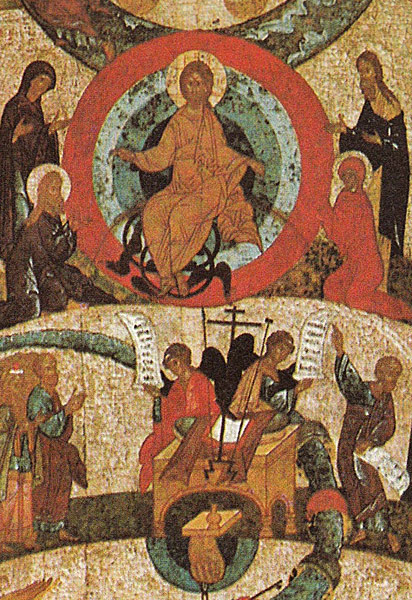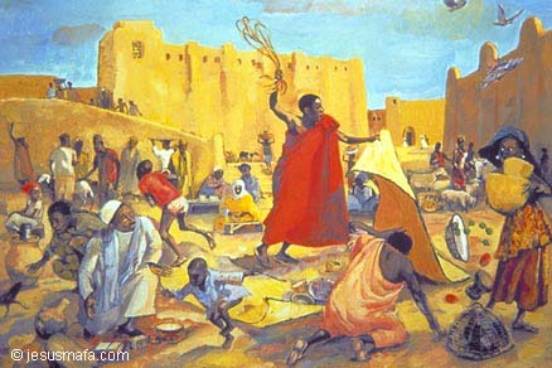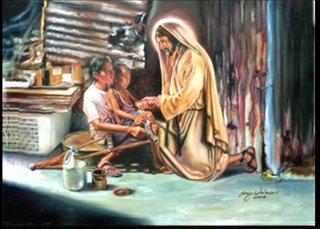Blessed are you who are poor, for yours is the kingdom of God.
Blessed are you who hunger now, for you shall be satisfied.
Blessed are you who weep now, for you shall laugh.
Blessed are you when men hate you, and ostracize you, and insult you, and scorn your name as evil, for the sake of the Son of Man. Be glad in that day and leap for joy, for behold, your reward is great in heaven. For in the same way their fathers used to treat the prophets.
But woe to you who are rich, for you are receiving your comfort in full.
Woe to you who are well-fed now, for you shall be hungry.
Woe to you who laugh now, for you shall mourn and weep.
Woe to you when all men speak well of you, for their fathers used to treat the false prophets in the same way.
Ancient poetry, otherwise known as Luke 6:20-26
Let’s look at the beatitudes again.
“Ahhh,” everyone sighs. “The beatitudes. How lovely. How comforting.”
How easy to ignore. How misunderstood.
We are all familiar with the words in Matthew. “Blessed are the poor in spirit. Blessed are the meek. Blessed are the merciful.” And on and on. And we love them because they seem so poetic and so loving and so helpful to us who live quiet lives of desperation in the pursuit of just living normal lives without poverty, without hunger, with some levels of justice and peace. We will buy plaques of the phrases and place them upon our walls to remind us of how loving and gentle Jesus’ teaching is.
But those weren’t the beatitudes I was talking about.
There’s another set, equally spoken by Jesus, found in Luke. They are certainly the same set of sayings, but they seem… different. They seem harsher, more difficult to accept, not the kind of Jesus who would comfort us.
After reading Luke’s version, we might be saying, “Who is this guy? This isn’t my usual preacher! No… good preachers don’t talk like this. They use words like ‘beseech’ and ‘Almighty’ and when they say ‘comfort’ it sounds like they really mean it. This guy, though, he sounds tough, almost mean. I mean, who would go to a church that sounded like this? People who were desperate might—or people that had issues with wealth—but not people who could afford to build a nice church building and give a guy a good salary and a parsonage. No wonder Jesus had no place to lay his head! Who would listen to this drivel more than once? The adage makes sense—A prophet is someone who isn’t invited to dinner twice.”
While we can critique the style or question Jesus’ propriety, we do need to remember the positive points. First of all, it is direct. And simple—no one can misunderstand it. And if it is true, then the message is significant. Oh, and one other point—Jesus is our Lord. And these are the words of Jesus.
These words aren’t just there as a jumping point for our understanding of spiritual matters. They aren’t supposed to be a cover page for our traditional values—whether conservative (“Life is tough and you’ve got to be tough back”) or liberal (“We should really be nicer to the poor”). They aren’t there to be politely ignored in preference to other passages that we prefer. Nor does it help for us to retranslate them into something more palatable (“Maybe it could say, ‘Gosh, what a difficult position you rich people are in.’ ”).
How significantly we treat these words is how significantly we treat Jesus. This teaching is at the core of what Jesus had to say, and all that he said and did flows from this core. If we are to accept Jesus, we need to accept this basic creed.
What is Jesus speaking of? What really is the point? If there is a creed, what would it look like, were it based on this text? Let’s break it down into pieces:
1. “We believe in an Almighty God who will judge everyone on the earth”
Judgment isn’t really popular to talk about. To speak of hell or eternal dishonor or lake of fire isn’t really a popular topic, so many Christians just avoid it. Honestly, many people have abused hellfire for their own agenda. So speaking about God’s judgement is kind of like an uncle who was convicted of child molestation, and though he hasn’t done anything like it since, no one talks about him and at Christmas he just finds a corner to sit in and watches the proceedings from a distance.
But Jesus firmly believed in a judgment of God that would paste “good” and “bad” on every single person on earth. Well, let me rephrase that a bit. The problem with saying “good” or its antonym is that we have such distinct notions in our head about what constitutes this “not-evil.” The early twentieth century bases of judgment seem so trite now: no smoking, no drinking, no dancing, no playing cards, no skirts above the lower calf, no fraternizing with actors. It seems trite because the values have changed so much.
When Jesus speaks of “good”, he really means “honorable.” At the onset, it seems so subjective. To have honor among Nazis is to be dissed by the masses. But Jesus gives this qualifier—the only person who counts, in giving honor, is God. I mean, if Simon Cowell determines that you suck, who really cares? But if God makes the determination that you are cool, or that you just don’t make the cut, then it is a more serious judgment.
Thus, judgment is boiled down to this: God saying to one group, “You’re my kind of people” and saying to another group, “You don’t really make the cut for me.” The first group, after the determination of the Judge, gains possession of a new nation, which is ruled directly by God, and becomes the central nation over it’s empire of the earth. The second group, certainly the larger, is exiled from that nation and they make up the outer fringes. Considering that almost all of the merciful are within the bounds of the Nation of God, the outer fringes just don’t sound like fun.
This kind of judgment isn’t comfortable to a group of Christians who believe that the term “mercy” and “judgement” cannot even date, let alone live together. They claim that Jesus hung out with lowlifes (true) and so he, as God’s representative, refuse to judge them (almost true), and so Jesus’ mercy has nothing to do with judging people (wow, you need to read Matthew 23 again). The fact is that every sub group of Judaism of the first century (and after) determined that there must be a line drawn separating those on the “in” with God and those on the “outs”. Jesus was no different.36 What made Jesus so radical is not that he erased the line, but where he placed the line. Which is the rest of our creed.
2. “We believe that the disciples of Jesus who are poor and persecuted will, at God’s judgement, obtain the greatest blessings of God.
This is the central point of both sets of beatitudes—in Matthew and Luke. This is not to deny that those who act in a “pure and righteous” manner will not gain God’s blessings. This is indicated in Matthew’s list, by giving a special line to the “pure in heart”. But for Matthew—as well as for Luke in the broader context—it isn’t enough to be “pure”. Sure, keeping your legs closed until God approves and not bowing down before a moldy statue is good and all, but it doesn’t equate the whole life that God is looking for.
God is actually looking for the folks who are so pure, so loving, so bold about Jesus, that they get in trouble for it. This “trouble” looks differently in different cases. Perhaps the trouble is rejection by people—Jesus certainly said that his community should expect that.37 But other kinds of trouble also pop up. There will be weeping in the Christian camp, and poverty. Some of this may be as a result of persecution, some of this will be due to the system set up to exclude Jesus people from the blessings of this world. The fact that Jesus’ people don’t collect possessions for themselves, but give them to the needy38; that they aren’t cut-throat, but humble in their leadership39; that they depend on God for their needs, even if those needs are just barely met40; that they do good to those who hurt them, which may give their enemies cause to think that they can get away with anything41—that might have something to do with it. Jesus’ requirement is a lifestyle of vulnerability. Let’s face it, Jesus’ way isn’t easy, and he doesn’t put up well with compromise. God might as well put up a sign, “Kingdom of God: Fanatics need only apply.”
3. “We believe that the anawim should be envied, and that if we are persecuted or obtain poverty for God’s sake, we should celebrate and feel honored.”
Saints are cool—from a distance. Some of the stories are great. Sebastian who was pierced by a hundred arrows for speaking about Jesus. Michael Sattler who was tortured, had his tongue cut out and then was drowned for teaching the Bible. Peter and John who were brought to court and beaten for healing a man in Jesus’ name. Anthony who lived in graveyards and the desert to live a life of purity. The stories are inspiring, but, ultimately, not for us. Not for real people.
We are the people who pray, “Lord, teach us patience, but not if it hurts too much.” We are the ones who want to live for God, as long as it fits into our overall plan of achieving the American Dream. We are the ones who cry out “All for Jesus I surrender”, but in practice, we limit our surrender to that which accommodates our society’s limits and morality.
If someone falls into poverty or persecution because of their stand for Jesus, how do we respond? Most people in the church would recommend a compromise, a standing down. “You don’t have to suffer like that—God doesn’t want that for you.” The church’s positions is: Stand for Jesus, but sit down if your feet get sore. Or, if there seems to be true injustice, there are the Jay Seculas and Rutherford Institutes who will take the persecutors to court and make them feel economic pain for the injustice of persecuting others.
Of course, Jesus’ command is a little different. How do we respond to persecution and pain and anguish for the sake of our religion? Have a party. Crank up the dancing music. Set out the little food that you need little forks to eat it with. Jesus’ bumper sticker is: Celebrate Poverty.

To be obedient to Jesus, it isn’t enough to just grit our teeth in difficulties, we need to rejoice, be happy, throw a party, invite our friends over to get ecstatic with us, watch the Wizard of Oz with the dip in bowls the shape of ruby slippers. “It’s the happy day!” Jesus says. “The day you get beat up and killed for God, that’s the day we’ve all been waiting for. The day you get sick and die because you were handing out tracts in a blizzard—that’s the party day! The day your airplane crashes because you were going to share the gospel with people in the jungle—that’s the dancing day! The day you get kicked out of your apartment because you’ve been inviting the mentally ill to worship God with you there—Live it up! Get some horn blowers and fireworks and make it seem like New Year’s day, because it’s better than that! It’s the day you’re assured of being right before God!”
4. “We believe that the disciples of Jesus who are conspicuously wealthy and honored today will, at God’s judgment, obtain sorrow and rejection.”
The real question is not, however, what happens to those who suffer for God. That’s a no-brainer. We’re all pretty sure of that, God will take care of them. They’ve got a place with God. Okay, that’s fine. But what about all those who hang with God and do all the religious things, but they don’t suffer? Perhaps they are doing the… um… opposite of suffering in the present life. There are people in God who are doing really well.

And, let’s face it, these non-suffering folks, the ones who have an excellent bank account (“for many years, frankly, and the accumulated interest is really very healthy and can’t be given away willy-nilly”), and a really nice home (“meant really for family and friends, it just wouldn’t be comfortable to have strangers stay there”), and a car that almost never breaks down (“but I couldn’t pick up hitchhikers, because, well, who knows what they would do”) and a line of credit that doesn’t end (“and we have to take care as to what we invest in, because otherwise we couldn’t be trusted financially”)—these non-suffering folk are really the ones who pays the bills in the church.
These aren’t vulnerable in this world, but they do their part, right? They show up on Sunday, sing as loud as anyone else, head committees, pay for the new building, makes sure the pastor has a decent salary. So, God has his place for them, right?
Absolutely. God has a place for them. It’s called “the outer darkness.”
Paul and Barnabas at one point set out to do some revival meetings. The churches they had planted were struggling spiritually, so the apostles had a powerful message to give to them. The summary we have received is one sentence, “We shall only enter God’s kingdom through much tribulation.”42 In other words, the ONLY door to God’s ultimate blessing is difficulty, sacrifice, persecution and hardship. There isn’t any other way.
This doesn’t mean that God doesn’t bless people on earth. Oh, my, I have seen many people blessed. Many rich people today are blessed in their lifetimes beyond the dreams of those who had lived on earth for more than ten thousand years of history. I mean, indoor plumbing, a health care system that can actually cure more illness than it causes, the ability to fill rooms with such variety of entertainment as has never been seen, never without food, never thirsty, never homeless. Such a plenty has never been seen in the history of the world for so many people. This is God’s blessing. And for those who are content to accept this blessing, this is all they will get.
- For those who have all their needs met, and never meet hunger—God has for them a place of hunger.
- For those who surround themselves with pleasantries and joy—God has for them a place of tragedy.
- For those who reward themselves for the simple act of living—God will strip away all trophies.
- For those who secure themselves by assuring their own wealth and separation from the poor—God will make them poor and expose them to eternal insecurity.
No, this isn’t funny. This isn’t entertaining. It’s scary. This is worse than Alien, worse than the Exorcist. This is the real spiritual existence. And for those who have all the world has to give—they should be grabbing someone’s arm, because the music is getting ominous.
5. “We believe that Jesus’ disciples who are honored and wealthy should set these benefits aside for the sake of our needy counterparts, so they can receive true honor and wealth.”
But Jesus’ beatitudes aren’t one of those horror movies that finishes with “The End?” They are more like an epic move—Laurence of Arabia, Gone With The Wind, Top Gun—the center of which you find yourself almost weeping and breathing hard in your empathy with the hero(ine). But in the end, through some terrible tragedies and sacrifices, the hero(ine) survives and achieves glorious honor. This is the story Jesus is telling as well.
And the story is the same for the poor and the wealthy: the way to God’s honor and blessing and kingdom is through becoming the anawim. That route is simpler for the poor and persecuted—they get handed their tribulation on a silver platter. They don’t have to exercise their will to suffer or sacrifice. For the rich, the famous, the good-looking, the educated, the white middle class folks, those who are granted all the best of the world: the route to God’s blessing is difficult. They have to give up all the blessing they have been granted.
Have you ever worked for the needy? Those who are really needy, those whom our society calls “the bottom of the barrel”, for whom no real help exists? To be friends with the friendless, to offer yourself to the needy, it is a daily sacrifice. You constantly struggle with how much to give, are you being taken advantage of, what is the real need, who of all the worthies should you give to with the limited resources you have? Inevitably, you give more than you realistically can, and personal and social conflicts arise. Your health fails. Your family and friends whom you trusted no longer find you to be trustworthy. You become an alien to all those whom you have loved. You become the avoided, the dispossessed. The one who surrenders themselves to the needy becomes one with the needy. The one who sacrifices for the anawim becomes the anawim themselves.
This is the challenge to the wealthy, the well-loved, the sheltered. Expose yourself to those whom you most fear—those whose needs far outweigh your ability to help them. Perhaps you will gain great satisfaction doing the work. Perhaps you will obtain prizes and be Time’s Man of the Year.

But let me be brutally honest (as if I hadn't been before). Of the few of you who make the choice to sacrifice all you have for the needy, to obtain God’s glory instead of security and inner peace—you will be put under the bulldozer. You will go to doctors and they won’t be able to tell you what’s wrong. You will be disinherited by proper society. You will have friends who tell you “you’ve just got to stop, for your own sake” but God won’t let you. You will wonder why you are exhausted all the time. You will go to bed each night as if you had been beaten.43 You will walk the streets and cry out to God, “Just give me rest!” but the rest never seems to come. The needy themselves will blame you for not giving enough. You will rack your brain to find ways to really help them, to really meet their true needs, and find no solution. You will cry and weep and mourn and wonder why God put you in this place. To do this work. To have what seems to be a pointless life.
Now I’ll tell you a secret. If you sacrifice yourself and feel all this—you’ve made it. You’re in. It’s time to celebrate. It’s time to party. Yeah, it seems pointless. To Jeremiah speaking about the destruction of Jerusalem seems pointless because no one he could see would listen. To David it all seemed pointless because his theocratic monarchy came crashing around his ears. To the disciples of Jesus it all seemed pointless because their Lord, their Savior was dying on a cross. Yeah, it all seems worthless—without resurrection. Without God.
“Vanity, vanity, all it vanity—everything done under the sun is vanity.” That’s Scripture. That’s God’s word. But, you see, if we embrace the vanity of God, the foolishness of God, the sacrifice of ourselves for the poor and needy, the life of the anawim—then we get all that exists above the sun. Under the sun? Screw under the sun. I’m looking for the best retirement plan that exists. Sure, the salary’s lousy. But the benefits—nothing can compare to them. And the only way to obtain them is to sacrifice one’s wealth and to stand with the anawim.

Notes
36. The polar opposites of Jesus is that although he welcomed sinners and the outcast into the kingdom (Mark 2:16-17; Luke 19:10), yet he also condemned people to hell on the smallest sins, such as insulting another and looking at the opposite sex with lust (Matthew 5:22, 28-29). Some people see Jesus as being the most lenient, while others see him as being the most strict. Jesus’ point was that there are two requirements to enter into God’s utopia (Mark 1:15): The first is repentance. This is recognizing the evil one has done and doing what one can to change it. This is what the religious leaders refused to do, because they refused to agree with Jesus about what sin is. Sin, according to Jesus, is refusing to give to the needy, acting hypocritically, and making excuses for one’s sinful actions (Luke 16:19-23; Matthew 13:41-42; Matthew 5:21-29). Thus, Jesus said, those who sinned terribly but recognized their need for repentance would enter God’s utopia, but those who refused to recognize their own personal (not theological) sin would be left out (Matthew 21:31-32). The second requirement is to trust God to live a non-survival lifestyle in the midst of a world trying to survive. That’s what this chapter’s about. Read on!
37. Jesus promised persecution to his disciples. John 15:18-16:3; Matthew 10:34-39; Mark 8:31-38.
38. Luke 12:33; Acts 2:44-45.
39. Luke 22:25-27
40. Matthew 6:25-34.
41. Matthew 5:38-48.
42. Acts 14:22. Also, see II Timothy 3:12.
43. Which is a quote from Louis Guanella.


















